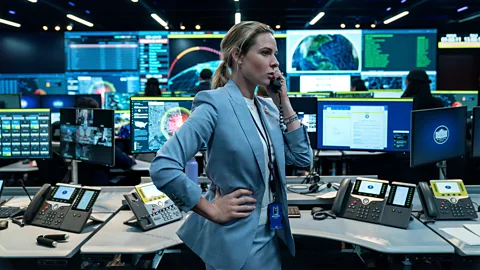Political thriller is perhaps an understatement for Kathryn Bigelow’s A House of Dynamite, her first film in eight years. Centred around an impending nuclear attack, told three times in succession from the perspective of first an intelligence officer in the White House’s Situation Room, then the military and Secretary of Defence, and finally, the President himself, it is tense, thrilling and nightmarish all at once, a cautionary tale of a threat we refuse to see or address. Yes, this is very much a horror film – and a brilliant one at that.
A steadfast Rebecca Ferguson presides over the first third of the film as Captain Olivia Walker, an intelligence officer with a family and a clear understanding and commitment to protocol (ordering anything other than an egg sandwich or oatmeal at the canteen holds up the line, she says to a new hire). In the White House’s Situation Room (and in parallel, in the missile defence operations base in Alaska), there is general banter and amicable workplace chat – how are the kids, when are you proposing, clean up your station. That is, until a greater threat than a messy desk imposes itself. At first, there is a chance that it could be an error – precautionary alarms are raised, protocol engaged. Walker is more alert than she is concerned, and senior staff keep the lesser experienced calm. But when fresh information is obtained and the potential error is confirmed as a very real nuclear missile launched towards the city of Chicago, those in charge only have eighteen minutes to decide what the next steps must be.
The action unfolds primarily in screen-filled rooms, desks facing the mother screen blaring all sorts of worrying colours as various operations teams track the missile and its likelihood of hitting the mainland. The three different perspectives necessarily involve the repetition of certain discussions, but each third gives a little more context as we discover the exact mindset it was said in. To begin with, there is a certain sense of disappointment when the second rendition begins – what else is there to cover, really? Perhaps not so much, as we are to find out. The first two sections are inevitably quite similar, focusing heavily on the reactions of various military and defence divisions, and while the second centres more so on the international relations aspect of the impending disaster (namely, who has launched said missile), it could have done with an extra thread to give it that slight distinction. Nevertheless, Bigelow’s ability to captivate three times in a row is a testament to her exquisite talent in building tension – there are still new details everywhere, a fresh perspective, insight into how certain rules must be followed, a value that is questioned. Everything and everyone appears to be a threat – she injects paranoia so effortlessly that a man with a suitcase becomes a potential traitor when he is, in fact, simply part of the staff. More so is her ability to make particularly complicated (geo)political situations high stake despite a lack of understanding of the most convoluted of deep state acronyms (STRATCOM, DEFCOM).
While Bigelow is certainly the star of her own film, the cast is as precise as the protocol they follow: a quick sideways glance, a quiet moment of tears are all perfectly orchestrated, so much so that a blink is enough for the audience to realise what is at stake. The chaotic handheld technique only adds to the angst, with sudden close-ups onto tense faces, the screen beeping red, the daunting “100%” as divisions realise this is not a fluke. The problem Bigelow presents to us as an audience is dual – it is firstly about the relationship we have with ourselves, as various characters’ values and morals are questioned: the Secretary of Defence (Jared Harris) must come to terms with the fact that his estranged daughter (a cameo from Kaitlyn Dever) lives in Chicago, while the President (Idris Elba) must make the hardest decision of his entire career based solely on prediction and panicked opinion. But more so, it is about the relationships we have with others, showcased most honestly in the conversation Baerington has with his Russian counterpart. Bigelow here takes us temporarily out of the American focus, and showcases both sides of the conversation, mirroring them – both advisors are heatedly talking to each other, while their superiors make gestures at them, write down on a notepad what they should say next. There is a protocol for an operations room, but, on the phone to a state who may have launched an unprovoked act, there is only rough estimates, trust of the other. No doubt shocking inadequacies in communication, Bigelow seems to be saying, for states who have been able to create such terrifying weapons of mass destruction.





